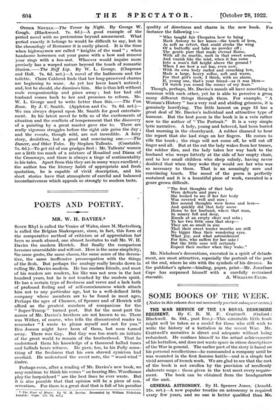POETS AND POETRY.
MR. W. H. DAVIES.*
SINCE Rhyl is called the Venice of Wales, since M. Maeterlinck is called the Belgian Shakespeare, since, in fact, this form of the comparative method of criticism or of appreciation has been so much abused, one almost hesitates to call Mr. W. H. Davies the modem Herrick. But finally the comparison becomes 'unavoidable and will out. Here is the same simplicity, the same gusto, the same charm, the same sense of the decora- tive, the same inoffensive preoccupation with the things of the flesh. But perhaps the analogy really breaks down in calling Mr. Davies modern. He has modern friends, and most of his readers are modern, his like was not seen in the last hundred years, but he is not touched by the modem spirit. He has a certain type of freshness and verve and a lack both of profound feeling and of self-consciousness which attach him not to any particular age, but to a well-defined little company whose members are to be found in most ages. Perhaps the ages of Chaucer, of Spenser and of Herrick will afford us the greatest numbers of companions for the " Super-Tramp " turned poet. But for the most part the names of Mr. Davies's brothers are not known to us. There was Wither, of course, who tells the discontented reader to remember " I wrote to please myself and not for you." Ben Jenson might have been of them, but soon turned away. There was Gay. But Gay was too much an initiate of the great world to remain of the brotherhood. That he understood them his knowledge of a thousand ballad tunes and ballads bears witness. He gave, too, to his Polly some- thing of the freshness that his own shrewd cynicism had overlaid. He understood the sweet note, the " wood-wind " timbre.
Perhaps even, after a reading of Mr. Davies's new book, we may continue to think his verses " on hearing Mrs. Woodhouse play the harpsichord " are the best lines he ever wrote. But it is also possible that that opinion will be a piece of con- servatism. For there is a great deal that is full of his peculiar
• The Hour of Magic. By W. H. Davies. Decorated by William Nicholson. London : Cape. [7s. ed. net
quality of directness and charm in the new book. For instance the following :-
" Who taught fair Cleopatra how to bring
Mark Antony to her knees—the touch of love, As soft as velvet, that could stroke the wing Of a butterfly and take no powder off ; The gentle purr that made eternal Rome, With all its marble, melt in that sweet sound, And vanish like the mist, when it has come Into a man's full height above the ground ?
When I see how a cat has, even now,
With its own body curled and crouching low, Made a large, heavy collar, soft and warm, For that girl's neck, I think, with no alarm,
If, young one, that's your friend—as it was Hers—
I'll watch you round the corner of my fears."
Though, perhaps, Mr. Davies's moods all have something in common with each other, yet he is able to perceive a great many different things through them. For example, " A Woman's History " has a very real and abiding grimness, it is genuinely horrifying. The little lament on page 13 has a great deal of Mr. Davies's individual and attractive type of humour. But the best poem in the book is in a vein rather new to the author of " The Portrait." It is a very simple lyric narrative. A lady, young and beloved, had been buried that morning in the churchyard. A robber chanced to hear the report that she had rings on her fingers. He comes to rifle the tomb ; the rings will not come off, he will cut off finger and all. But at the cut the lady wakes from her trance, the robber flies, and the lady takes her way back to the husband who weeps bitterly at the side of her empty chair, and to her small children who sleep calmly, having never doubted that when they woke they would see her who was so necessary to them. That is an amazingly sure and convincing touch. The mood of the poem is perfectly sustained and it is a beautiful piece of work, executed in a genre grown difficult.
" The first thoughts of that lady Were delicate and pure : She looked to see if her fair body Was covered well and sure ;
Her second thoughts were home and love—
And quickly did that lady move Home to her husband, where that man, In misery full and deep, Kneels at an empty chair and sobs ;
To her two little ones that sleep—
They are so small in size That their sweet tender mouths are still No bigger than their wondering eyes. What joy, and what astonishment For him, who suffers for her sake i But the little ones will certainly Expect their mother when they wake."
Mr. Nicholson's decorations, executed in a spirit of detach- ment, are most attractive, especially the portrait of the poet at the end, where he sits with the symbols of his dreams. In the publisher's sphere—binding, paper, print—Mr. Jonathan Cape has surpassed himself with a carefully restrained










































 Previous page
Previous page